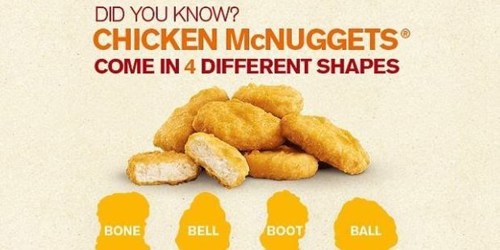Chicken McNuggets were a hit around the world, and with good reason. They were boneless, easy to eat, and easy to dip in any person's favorite sauce. Letterman did also say, "Let’s assume for a minute that there is a portion of the chicken anatomy that can accurately be described as nuggets. Is this something you want to eat, huh?” That said, McDonald's Chicken McNuggets became immensely popular.
Also, McDonald's played a key role in the globalization of the late twentieth century. In 1990, the chain opened a store in Pushkin Square, Moscow. This was, without a doubt, a symbolic moment between the US and Russia at the end of the Cold War. More than 30,000 Russian citizens went to that McDonald's just on opening day.
Between 1988 and 1996, McDonald's doubled the amount of restaurants. There were 20,000 stores by 1996. By 2000, McDonald's had 11,000 stores outside of the United States. Today, there are over 37,000 McDonald's franchises around the world. This international expansion shows the huge spread of United States culture. This increased international influence is a process known as globalization.
Globalization is a quite controversial issue; some argue that it is best not to interfere or push into other countries, while others argue that it is beneficial and good for others.
Looking at the positives of globalization, it can boost the global economy. It represents free trade, which can create jobs, increase competition, and lower prices for consumers. Proponents of globalization also argue that investing foreign capital and technology allows other nations to be more prosperous and democratic. This, however, is quite idealistic and falls short in real-world applications of globalization.
 Those who oppose globalization say that it makes the rich richer and the poor poorer, which is true in many cases. Managers and investors thrive while workers struggle. Opponents also argue that globalization leads to an exploitation of labor and it, in many ways, resembles colonialism.
Those who oppose globalization say that it makes the rich richer and the poor poorer, which is true in many cases. Managers and investors thrive while workers struggle. Opponents also argue that globalization leads to an exploitation of labor and it, in many ways, resembles colonialism.Nevertheless, McDonald's has been widely successful and it remains the largest fast-food corporation today. As a side note, Chicken McNuggets come in four different shapes: bone, bell, boot, and ball. These were specifically designed to make dipping easier and more effective.
Sources:
https://www.everything80spodcast.com/chicken-mcnuggets/
https://www.thestreet.com/markets/history-of-mcdonalds-15128096
https://www.forbes.com/sites/mikecollins/2015/05/06/the-pros-and-cons-of-globalization/#4df6487bccce
https://www.statista.com/statistics/219454/mcdonalds-restaurants-worldwide/
https://www.imf.org/external/np/exr/ib/2008/053008.htm
https://corporate.mcdonalds.com/corpmcd/about-us/history.html
I think that this post is very interesting and it shows one way in which globalization began to occur. As mentioned, today there are many McDonald's franchises around the world. In fact, McDonald's has locations in over 100 countries and together they serve around 69 million people per day. While there are restaurants world wide, the menus aren't all the same. McDonald's restaurants adapt their menus to local tastes. For example, in Japan there is a pork patty teriyaki burger and Germany serves a shrimp cocktail.
ReplyDeleteSource:
https://www.thoughtco.com/number-of-mcdonalds-restaurants-worldwide-1435174
This blog was really informative and interesting to read! I think it's super interesting how you were able to tie McDonald's and its role in globalization, as well as the controversy over globalization itself. While there are no doubt many factors (economic, political) contributing to the pros and cons of globalization, I think that the kind of positive and symbolic aspect of globalization (like what McDonald's did) is in fact a good thing. I researched a few other companies that helped foster peace in the face of conflict, and I found the Coca Cola, or "Coke" has also helped promote peace and optimism. Coca Cola is currently investing in a purpose driven marketing campaign across Western Europe. They want the drink to symbolize unity in a "hostile and divided world". I think it is great that these companies are trying to close divisions through simple things like a drink or a chicken sandwich.
ReplyDeletehttps://www.thedrum.com/news/2020/02/13/coca-cola-wants-unite-divided-hostile-world-it-won-t-touch-politics